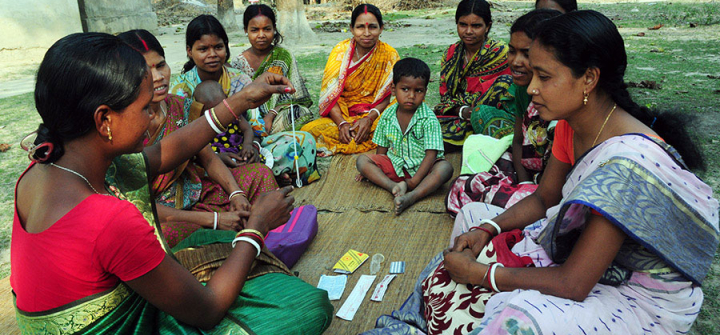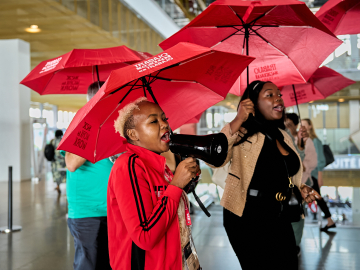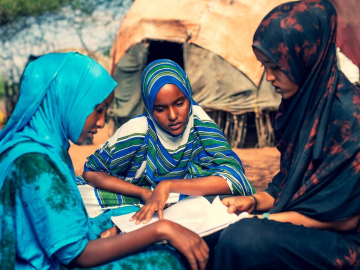In London, Reviving Ambitious Goals: Q&A with Duff Gillespie
United around the goal of expanding contraceptive access for women and girls in the world’s poorest countries, family planning leaders convene today in London. The meeting—co-hosted by the UK Government, the UN Population Fund (UNFPA) and the Bill & Melinda Gates Foundation in close partnership with the Family Planning 2020 (FP2020) Secretariat—marks the 5-year anniversary of the inaugural London Summit on Family Planning. Attendees at that first Summit set an ambitious goal: to empower 120 million additional women and girls in the 69 lowest-income countries to use modern contraception by 2020. Today, they aim to take stock of the progress and obstacles, re-energize family planning champions, and confront the ever-growing challenge of fueling the ambitious goal amid a massive funding gap.
Advance Family Planning (AFP) Director Duff Gillespie, PhD, a professor in the Department of Population, Family and Reproductive Health at the Johns Hopkins Bloomberg School of Public Health, explains the task at hand and gives his insights over the ups and downs so far, and what needs to change to keep progress on track.
To watch a livestream of the Summit, learn more about Family Planning 2020, and join the conversation on social media, please visit here: http://www.jhsph.edu/news/stories/2017/world-population-day-and-family-planning-summit.html
What do you hope this London Summit will accomplish? Why is a second summit needed?
While there are many desired outcomes we hope will flow from the Summit, they all represent a reenergizing of the world’s commitment to increase access to quality family planning services. The 2012 London Summit was remarkable. 32 developing countries, donors and scores of NGOs made commitments to increase the number of new family planning users by 120 million by 2020. But a lot has happened in the last 5 years. It is always challenging to maintain support, political commitment, and enthusiasm for any initiative or movement.
One reason sustained efforts are difficult is yesterday’s champions are not today’s. Of the 3 original co-chairs, only Melinda Gates remains active. Theresa May replaced David Cameron as Prime Minister of the UK and, tragically, the head of UNFPA, Babatunde Osotimehin, recently died. And, of course, Donald Trump has decidedly less favorable views on family planning and foreign assistance in general.
Ministerial-level leaders implement their country commitments, but probably only a handful of ministers involved in the London Summit remain in office 5 years later. So, at a minimum, the 2017 Summit provides a global platform for new champions to emerge.
Where has the Family Planning 2020 partnership succeeded, and what are the biggest obstacles to extending family planning access to an additional 120 million women and girls by 2020?
In a word, the biggest obstacle to achieving FP2020’s goal is money. Considering only contraceptive commodities, there is an estimated $437 billion gap between current spending and needs. Donor support for international family planning has remained static, an unfortunate situation that the anticipated cuts in US funding will exacerbate. While some donors plan to increase their funding, they’re unlikely to fill the gap created by the Trump Administration.
The most likely source of additional funds are the developing countries themselves. Presently, national governments account for only 24% of family planning funding. An immediate objective of the Summit is to encourage governments to increase their financial commitments.
Considering the funding constraints family planning programs have operated under since 2012, the FP2020 partnership has accomplished a great deal. In FP2020’s 69 focus countries, an additional 30 million are now using family planning. While this is 19 million fewer women than needed to be on track to achieve FP2020’s goal, it is still an impressive accomplishment.
The partnership is in much better shape now than in 2012. Each of the commitment countries brings together champions who seek to keep family planning high on the agenda. Through a variety of mechanisms, including the PMA2020 survey project headquartered here, the partnership has much better information on such things as funding and contraceptive use. Perhaps most importantly, there is an active Secretariat that not only tracks progress, but also works to increase the political commitment to family planning.
Given your experience working for USAID for 3 decades—spanning much of the Mexico City policy’s bumpy history—do you think the reintroduced, expanding policy and anticipated US budget cuts threatens FP2020 progress?
There are still uncertainties about the details of the Trump Administration’s global health and family planning policies, but there is no doubt that they will have a major impact on the field. After all, that is what they are designed to accomplish. The possible negative scenarios are too numerous to mention here, but here are a few.
The 2 largest family planning international NGOs, the International Planned Parenthood Federation and Marie Stopes International, have refused to sign the Mexico City policy. This decision—to refuse US government funding so that they can continue to provide a range of family planning services including safe abortion where legal—will mean a significant loss of financial support. It will likely result in depriving thousands of women of family planning services.
Concerning the proposed budget cuts, the Administration has zeroed out USAID’s family planning budget. The US accounts for 47% of all donor funds in this area. While Congress will almost certainly not agree to the elimination of the USAID’s family planning program, even a 25% reduction in the program’s current level of support ($575 million) would have a devastating impact. The Kaiser Family Foundation estimates that such a reduction would result in 1.9 million unintended pregnancies and 819,000 abortions.
How have Advance Family Planning’s (AFP) advocacy efforts helped strengthen governments’ commitments to family planning?
AFP works closely with the FP2020 partnership. In our 10 focus countries (Bangladesh, Burkina Faso, the Democratic Republic of the Congo, India, Indonesia, Kenya, Nigeria, Senegal, Tanzania, and Uganda) our local partners have achieved over 480 advocacy wins that increased family planning funding and expanded the contraceptive mix, especially in underserved populations.
To give just one example, in Kenya, we work closely with county governors, who are outstanding family planning champions. 10 counties developed and approved costed action plans to effectively invest in family planning, with the support of AFP advocates. These plans are bearing fruit—family planning budget allocations in 6 counties in the last year increased 413% from the year before, totaling $1.27 million in local funds.
Looking forward, what do you see as promising developments?
Almost without exception, developing countries have policies to support family planning. Importantly, couples want family planning information and services. Our experience in AFP shows that when policy makers at the national and subnational level are informed about the benefits of family planning, more times than not they will increase their political and financial support to family planning, even in resource poor situations. Based on this experience, we are optimistic that FP2020 progress can be greatly accelerated.
This interview has been edited for clarity and length.
Join the thousands of subscribers who rely on Global Health NOW summaries and exclusive articles for the latest public health news. Sign up for our free weekday enewsletter, and please share the link with friends and colleagues: Subscribe to GHN
A rural health worker teaches women about the IUD and other contraceptive methods at a remote village in Kushamandi, South Dinajpur, West Bengal, India. ©2016 Tushar Sharma, Courtesy of Photoshare





